Arduino Yún controlling a 12 mentos-coke installation!

What happens in Zaragoza when you mix David Cuartielles, a group of teens, an Arduino Yún, 12 cokes and a bunch of mentos?
Here it is:

What happens in Zaragoza when you mix David Cuartielles, a group of teens, an Arduino Yún, 12 cokes and a bunch of mentos?
Here it is:
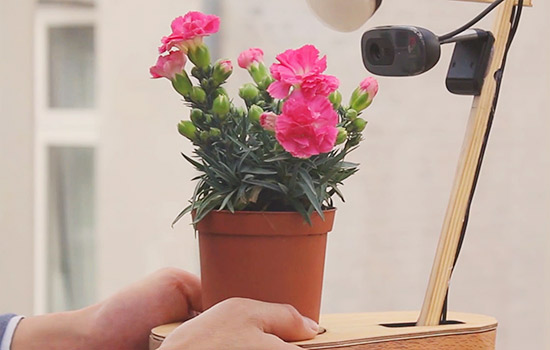
The Selfie Plant is an interactive installation taking pictures of itself using Arduino Yún, Facebook Graph APIs and then uploads them to Facebook. It was developed by a group of students at the Copenhagen Institute of Interaction Design during “The secret life of objects” course held also by Arduino.cc team by Joshua Noble and Simone Rebaudengo. The final prototype was on display at the class exhibition, to observe the interaction of the audience with it, and the results are on Facebook.

The Selfie Plant is an attempt to provoke some thoughts above genre of expression. The Selfie Plant expresses itself in the form of nice-looking selfies, which it clicks according to its mood, weather or occasion. It mimics human behaviour, by giving it’s best pose and adjusting the camera angle to take the perfect selfie.
In the documentation on Github you can find all the details of the project composed by an Arduino Yún, controlling 2 servo motors and adjusting the positions of the plant and the camera stick; a python script (facebook.py) which communicates with Facebook’s graph API to post the captured photos on plant’s Facebook profile. In addition you’ll need also a LED Matrix, a Bread Board and 5 Volt Battery.
Here’s a preview of the diagram:
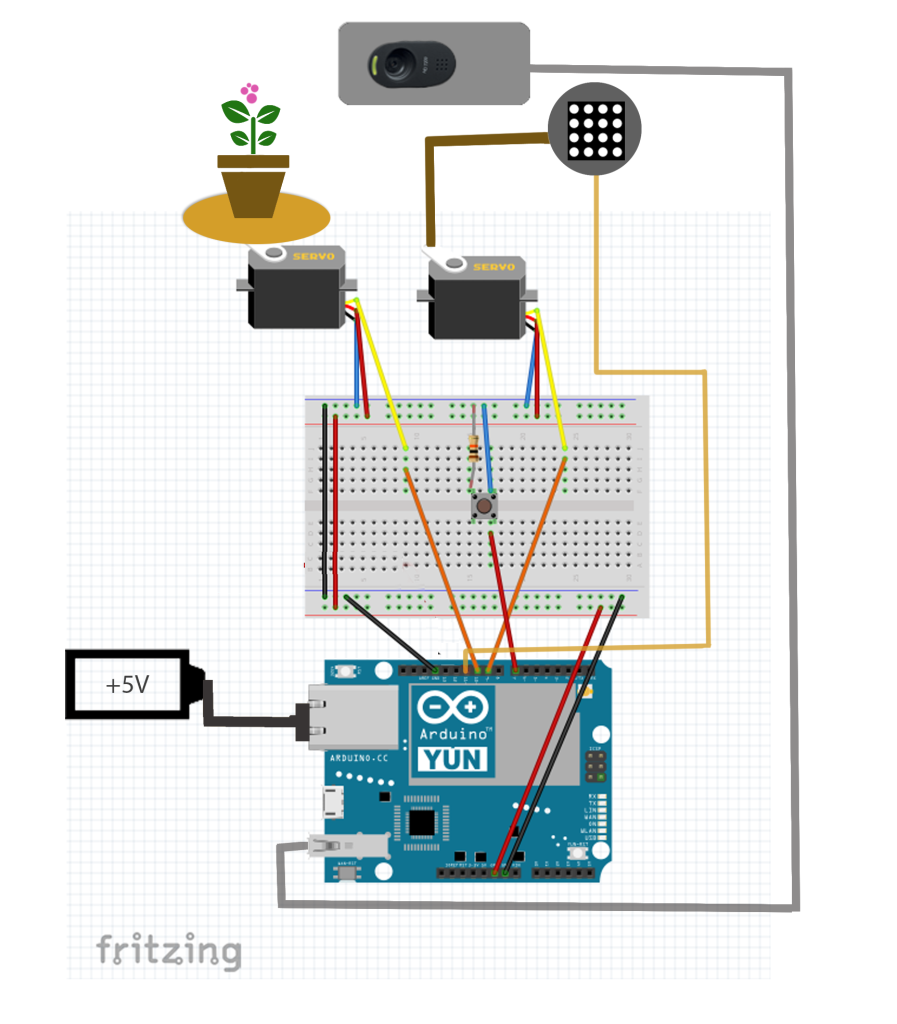

Selfie Plant is an interactive installation taking pictures of itself using Arduino Yún, Facebook Graph APIs and then uploads them to Facebook. It was developed by a group of students at the Copenhagen Institute of Interaction Design during “The secret life of objects” course held also by Arduino.cc team. The final prototype was placed in the exhibition of the school, to see the interaction of the audience with it and you can see the result on Facebook.

The Selfie Plant is an attempt to provoke some thoughts above genre of expression. The Selfie Plant expresses itself in the form of nice-looking selfies, which it clicks according to its mood, weather or occasion. It mimics human behaviour, by giving it’s best pose and adjusting the camera angle to take the perfect selfie.
In the documentation on Github you can find all the details of the project composed by an Arduino Yún, controlling 2 servo motors and adjusting the positions of the plant and the camera stick; a python script (facebook.py) which communicates with Facebook’s graph API to post the captured photos on plant’s Facebook profile. In addition you’ll need also a LED Matrix, a Bread Board and 5 Volt Battery.
Here’s a preview of the diagram:

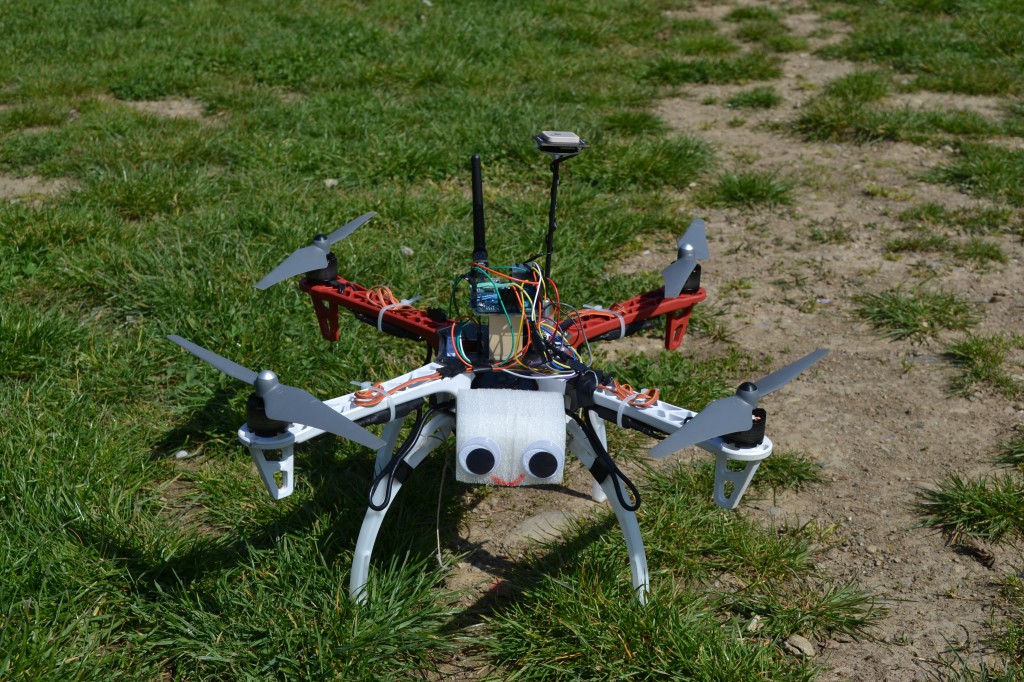
Comelicottero is a quadcopter based on Arduino Yún created during the Master in Computer Science at the Universita’ degli Studi of Milan (Italy) by Simone Castellani, Giovanni Intorre and Andrea Toscano:
The idea was to build a drone able to be controlled through WiFi from any PC, tablet or smartphone . Comelicottero is equipped with an accelerometer and a gyroscope for the stability obtained by a PID-based control system. Since Servo library is too slow for the quadcopter dynamics, an hardware PWM was implemented to obtain a 400Hz PWM signal.
The communication between the ground station on a PC and the quadcopter relies on WiFi and, in order to get better results, Bridge library was replaced with an efficient python script on OpenWRT-Yun. On top of that all the code was written to maximise Arduino Yún capabilities. The Navigation System has been designed, simulated on PC, implemented and tested. The autonomous navigation is going through an additional testing due to magnetometer interferences with motors’ magnetic field.
The user can control and monitor data coming from the drone using a gamepad attached to a laptop with a custom software installed.
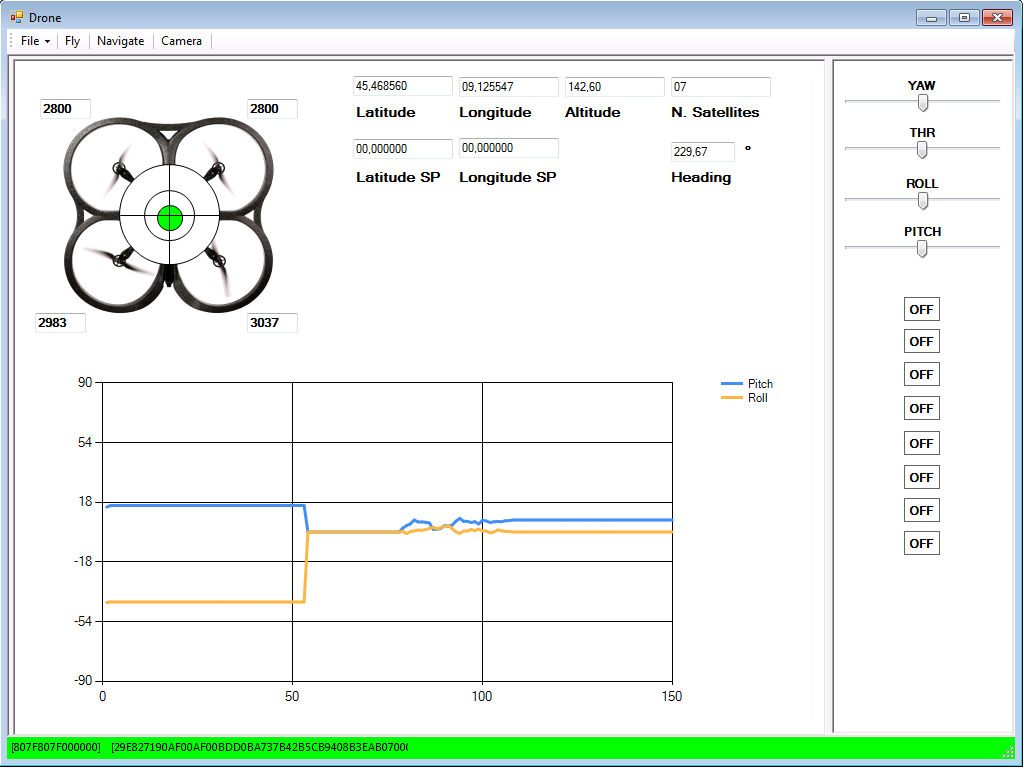
The sketch and all the documentation will be soon available on GitHub and released with GNU license. In the meanwhile follow their Youtube Channel for updates.
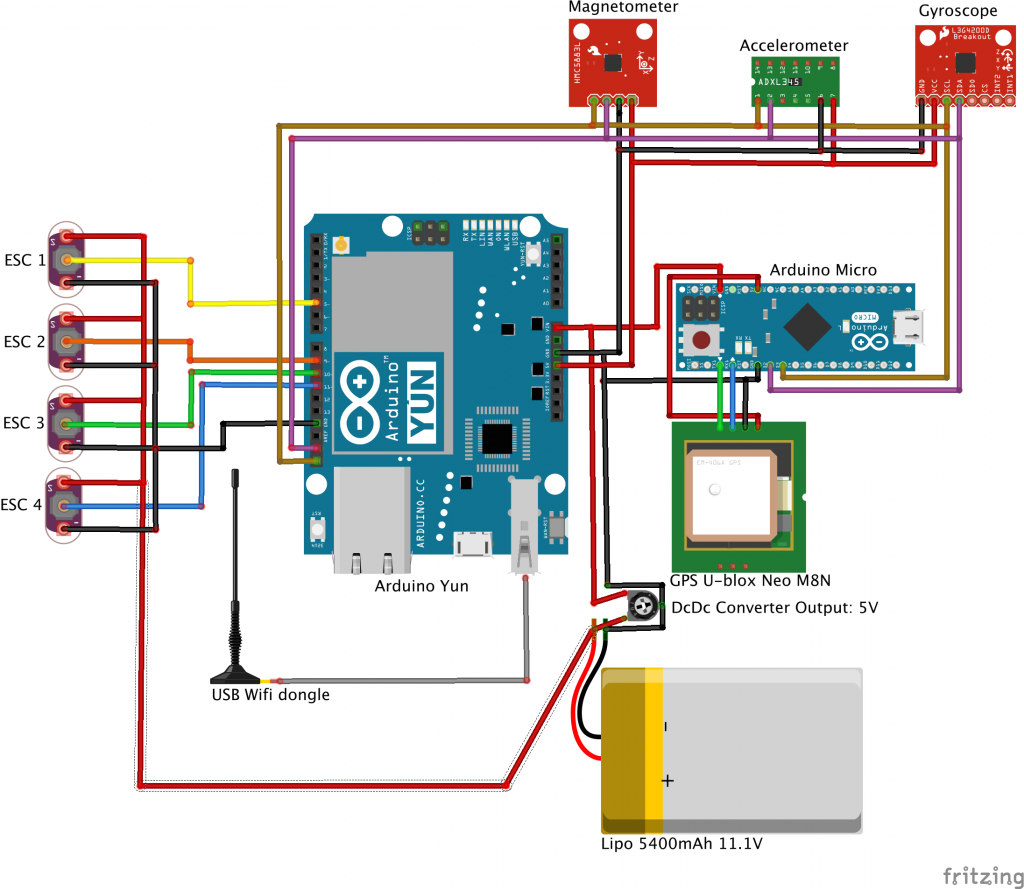
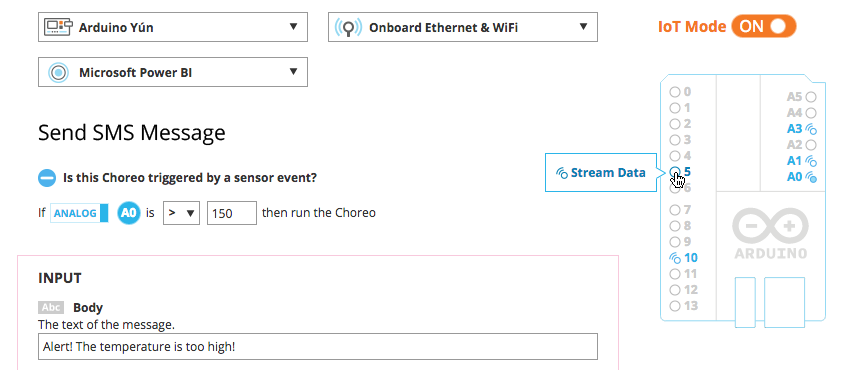
Our friends at Temboo just introduced a new way to log data from an Arduino Yún to the cloud. Called Streaming, it lets you visually select the sensors attached to your Arduino that you have gathering data, and then stream that data to the cloud IoT platform of your choice.

Streaming also makes it easy to switch where you’re sending your data once your application is running, without requiring any hardware or software updates. Right now, Streaming works with Microsoft’s Power BI and Google’s BigQuery, but Temboo will be continuing to add more platforms in the future. As with Temboo’s other Arduino programming tools, Streaming lets you generate all the code you need for your application right in your browser, and tailors that code to the parameters that you specify. It makes it much easier to store sensor data from your Arduino in the cloud, and to analyze the datasets that you build.
This video shows you how it works:
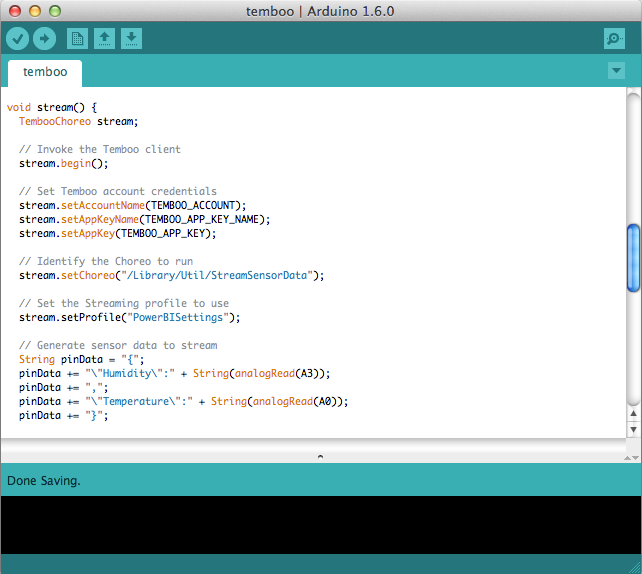
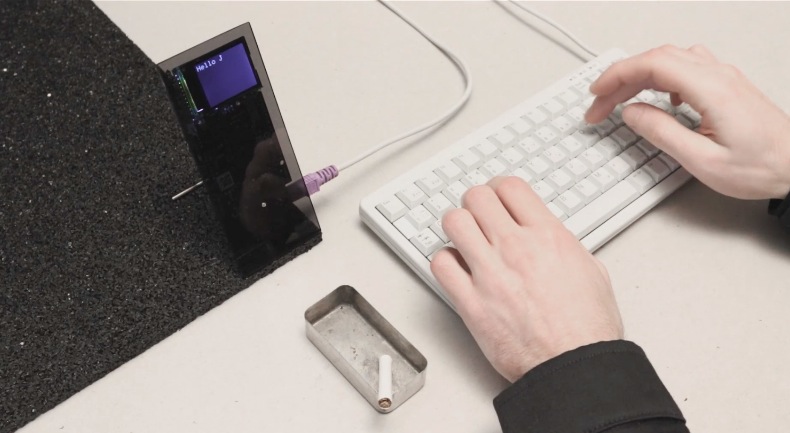
Jochen Maria Weber is a Researcher and Designer at the intersection of Interaction- and Industrial Design. He shared with us Project Cuckoo, a project running on Arduino Yún and looking at our interactions with intercepted social networks and how alternative ways of communicating might change them:
Twitter, Facebook, Google+ and co. collect our data and are forced to have a backdoor for state surveillance. Therefore Cuckoo encrypts messages into randomly generated words, meanings and noise in order to scatter them over multiple communication networks simultaneously. Each letter of an original message gets translated into complex forms of certain length forming new sentences. Those sentences get posted to aforementioned social networks, next to randomly generated noise-sentences for distraction. The encryption method can be changed with every new message. Any receiving Cuckoo-unit following the respective social network accounts can filter and decrypt the important posts according to their encryption method and time stamp. Cuckoo combines social networks to build a hidden one on top of their infrastructure. An egg in the others’ nests.
Cuckoo uses an Arduino YUN to connect wirelessly as a stand-alone device to the internet. It also does the en- and decryption of all messenges and made it comfortable to connect to Twitter, Skype and Tumblr API with Temboo.
Take a look at the video on Cuckoo’s website.
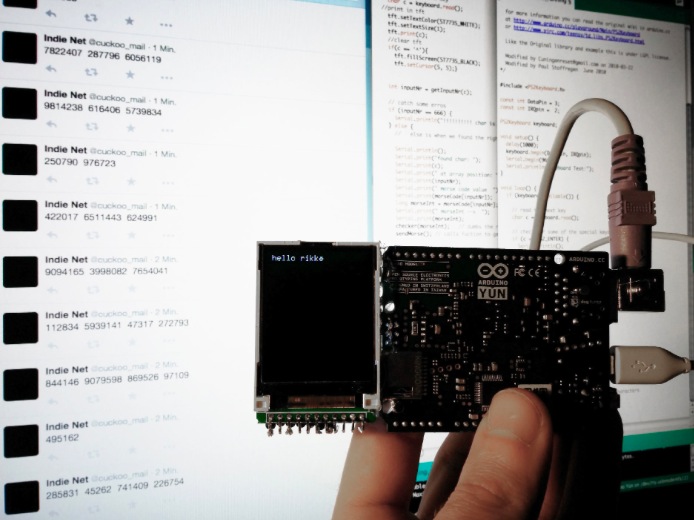
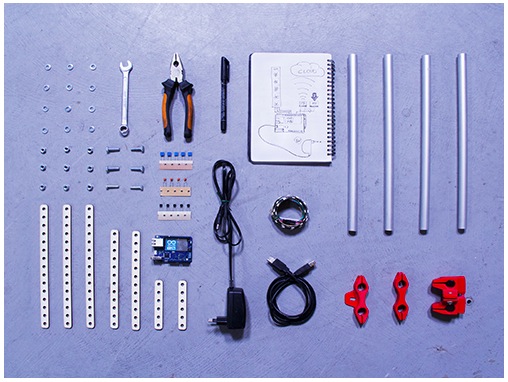
The location of the Casa Jasmina apartment will officially be inaugurated here in Torino (Italy) on the 20th of February, together with the celebration of the 3rd birthday of local Officine Arduino and Fablab Torino.
The two following days (21-22 of February) we’re going to start producing the first connected things for the apartment in a workshop with the support of Jesse Howard, a designer focusing on new systems of making.
He’ll fly in from Amsterdam and run a 2-day session together with Lorenzo Romagnoli (Casa Jasmina Project Manager) and Stefano Paradiso (Fablab Torino Coordinator) with the goal of designing and manufacturing an Open Source Connected Lamp (OSCOLA).
The workshop is suitable for designers, artists, hackers, and everyone interested in Arduino and open source design and in order to stress the idea of open design, participants will be asked to reinterpret, modify and redesign an open source lamp proposed by Jesse Howard.
A minimum familiarity with of CAD drawings, digital fabrication techniques and Arduino are recommended but not strictly necessary.
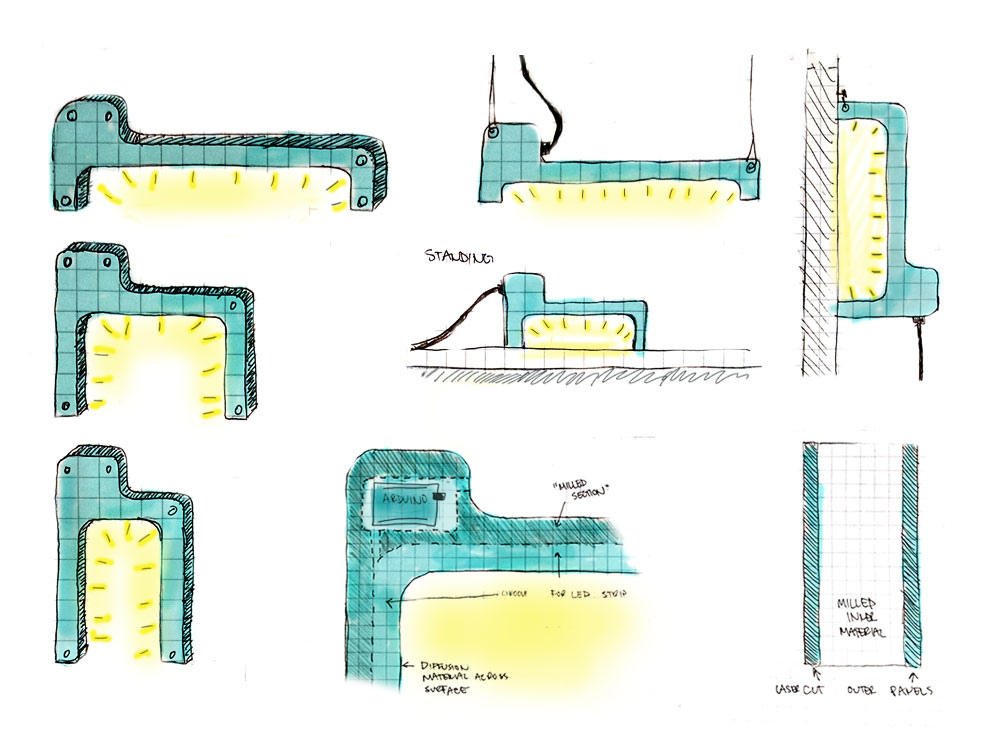
By changing materials, shape, use cases, mechanics, and interaction, we are going to create a family of open source lamps.
Arduino Yún will be used to make the lamp interactive, enabling the user to turn it on or off remotely; change the light color; use the light to visualize data etc, or connect one lamp to an other.
The OSCOLA workshop (book your participation!) consists of 16 hours of class taking place at Fablab Torino and a ticket is valid for two people. At the end of the workshop, each couple of participants will bring home their IoT open-source lamp and a copy will be reproduced to stay at Casa Jasmina!
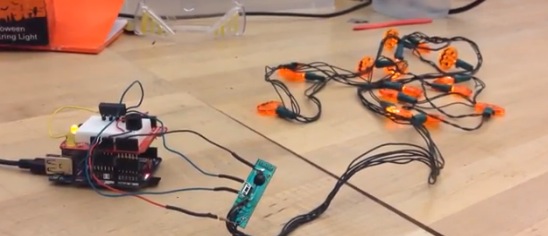
December is finally here and we can start thinking about indoor or outdoor decorations for the holiday. Christmas lights are an excellent way to light up any event and a user on instructables wanted to be able to control the lights remotely with text messages.
Check his 12-step tutorial and take a look at the bill of materials:
- An Arduino Yún – You could use another Arduino with a Wifi Shield though.
- A Protoshield with (or without) a tiny breadboard
- A regular breadboard will work as well, but will be less compact.
If you want to solder more, you can just use a small circuit board instead.- A 5V relay
- A piezo buzzer
- Wires
- A battery operated Christmas decoration (It’s not even Thanksgiving, so I’m using a Halloween decoration)
- A Temboo account
- A Twilio account
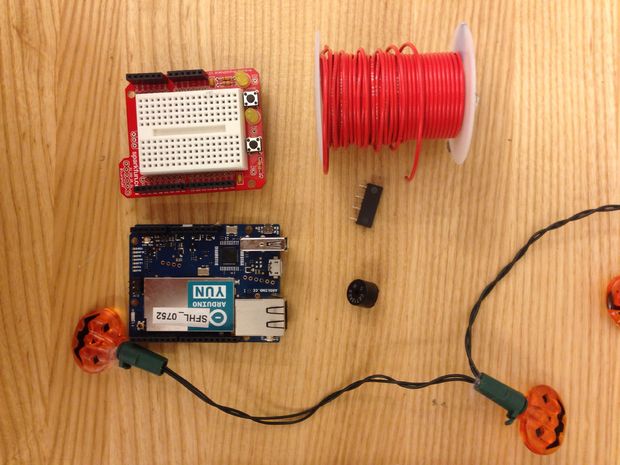

A week ago we were in London for an introductory workshop on the Arduino Yún. The participants were mainly beginners, knew the basics about Arduino and had the chance to learn about the Bridge library, how to control the board locally through the browser and to use Temboo to connect the plant to Twitter. See the pictures on the our Flickr account.
Arduino history is tied to the city of London: the first Arduino workshops ever took place right there.
We are now planning to organise more #ArduinoTour activities in UK and we are looking for teachers and ambassadors of the Arduino community in London and also UK in general. Are you interested? Fill the form!
Next workshop in the City is scheduled on the 20th and 21st of December and it’s focused on beginners. On the 19th from 6 to 8 pm there will be a public presentation on the Arduino project and also get in touch with possible collaborators. Take a look at the program and book your participation to the workshop – (location still to be defined, more news soon).